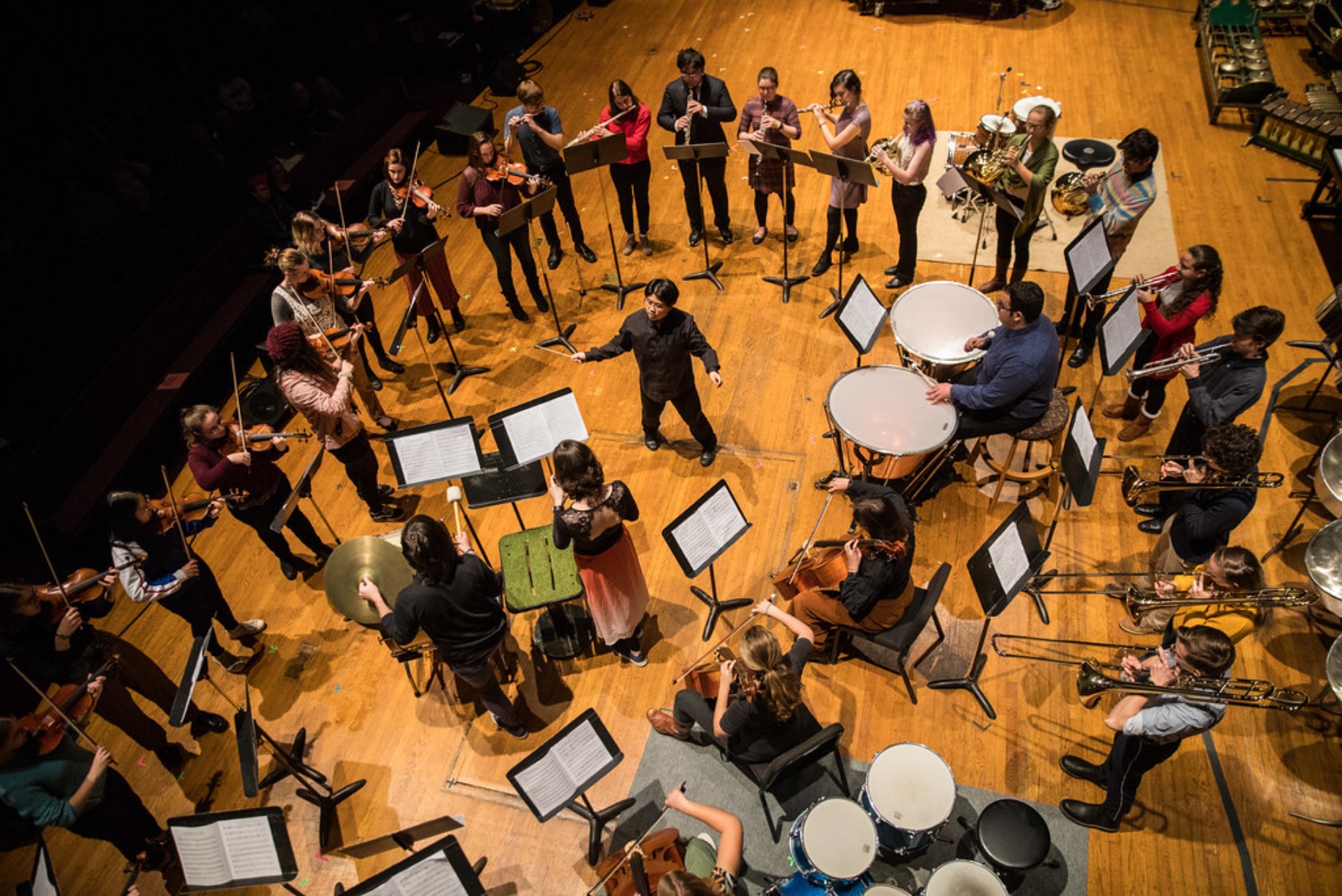Alright – so today we’ve got the honor of introducing you to Tiffany Chang. We think you’ll enjoy our conversation, we’ve shared it below.
Alright, Tiffany thanks for taking the time to share your stories and insights with us today. Can you share an important lesson you learned in a prior job that’s helped you in your career afterwards?
There is a quote by Annie White that sums up a lesson I keep having to learn: “You can’t make someone love you by giving them more of what they already don’t appreciate.”
I held a job as a conductor at an academic institution for three years. I don’t think I’ve ever worked harder in any other job. I also don’t think I’ve ever felt as undervalued in any other job. This dissonance was super confusing. The harder I worked, the more I felt I wasn’t living up to expectations. I didn’t understand why. I felt like I was doing good work, so why wasn’t it being received positively and recognized? In fact, my artistic efforts were often met with mostly criticism and skepticism.
What added to the confusion was that the people were generally very nice to me. I think they even respected my work – maybe? (To this day, I’m still not sure.) But their actions told me a different story. None of my colleagues came to my concerts in those three years. Other colleagues declined to collaborate with me citing my lack of credentials. The administration became weary when I gained visibility for my work outside of the institution. It felt like they were actually embarrassed by my work.
I didn’t know what to do and how to feel. My solution was to just work harder. While I remain confused, I was motivated in an “I’ll show you” way. I wanted to prove that I deserved their love, recognition, and appreciation. Those efforts resulted in some high-quality, innovative work from me. Despite my working harder and doing better, I continued to feel the dissonance. I was proud of my work. Why couldn’t they see it? It was so frustrating.
I finally learned that they were never going to see it. They were never looking for it in the first place. What they wanted from someone in my position was not what I had to offer. It didn’t matter how excellent my work was. They weren’t looking for my standards. We did not agree on what my orchestra needed. We did not agree on what success and progress would look like. I was not wrong. They were not wrong. We just didn’t agree.
As much as it hurt and I wanted to believe that I could convince them otherwise, I had to learn this was the problem. And I had to accept that this was an OK problem. They did not appreciate what I was giving them. I couldn’t make them love me by giving them more of it. When I understood this, I knew what I needed to do. I needed to leave. It was terrifying to leave. Though once I did, I immediately felt better. It could not have been clearer.


Tiffany, love having you share your insights with us. Before we ask you more questions, maybe you can take a moment to introduce yourself to our readers who might have missed our earlier conversations?
I’m a conductor obsessed with leadership and helping musicians feel more valued, seen, and fulfilled in their work.
I began my musical studies playing the cello and the piano. During my college years, I quickly found that every aspect of music fascinated me. I wasn’t just interested in performing. I was equally curious about music composition (the creative process in building ideas) and music theory (analyzing and reverse-engineering how a composer put their ideas together). l also loved leadership, helping a group of people from point A to point B and becoming better along the way. I love seeing minds being open as I share something that perhaps can inspire people to access something they never thought was possible.
Becoming a conductor allowed me to combine all those curiosities into one job – I can perform and create art in real-time on the stage, I can think about how music works from a composer’s perspective, I can solve mysteries in figure out how composers put their works together, and finally, I can serve other musicians as a leader.
My path has taken me to so many realms in the performing arts – being a conducting professor, conducting university orchestras of all levels, working with youth orchestras, guest conducting professional and community orchestras, leading opera productions across the country, premiering brand new works with new music ensembles, and collaborating with stage directors, dancers, multimedia and visual artists. I love exploring how different art forms intersect and support each other in something bigger than ourselves.
Recently, my ongoing interest in leadership led me to explore industries outside of the arts (particularly business and marketing). I became curious about how non-musicians have made strides in advancing what leadership means, and I can’t help but find that the arts remain stuck in old paradigms. In reflecting on what I’ve learned, experienced, and observed as a professional in the arts, I realized that we are a profession (and perhaps a whole world) governed by fear. I’ve become interested in how other industries have been talking about how to build work cultures that promote psychological safety and a sense of belonging so we can be more innovative and feel more fulfilled by our work.
The music industry needs all of that.
So in the last couple of years, I’ve added content creation to my plate to help usher in the change that I hope to see in the arts industry. I started a weekly blog called Conductor as CEO where I take ideas from other industries and share how arts leaders can apply them in our work. I started to create safe spaces where like-minded individuals can have conversations that we are all afraid to have.
I’m learning that I don’t need to have all the answers, but simply showing up every day to do this work has helped me get closer and closer to being the artistic leader I aspire to be. This thought leadership work has transformed my conducting work in rehearsals and performances. And I look forward to continuing on this never-ending journey of growth as an artist and human.


What do you think is the goal or mission that drives your creative journey?
According to a study, job satisfaction rates for orchestral musicians ranked below that of prison guards. This is an ongoing challenge and an underrated opportunity – a problem I am committed to solve, on the podium as a conductor and off the podium as a thought leader. What sets me apart from most conductors is my obsession with learning why this happens and how we can do better.
My mission is to help musicians feel more valued, seen, and fulfilled, and help arts leaders do so too for their organizations.
We would not be artists if we don’t love what we do. This is a challenging profession. We strive for transcendental artistic goals that, alas, we might rarely (or never) achieve. We are achievement junkies. We subject ourselves to criticism and rejection constantly. We put ourselves in the position to be tested every day. We make huge sacrifices. Despite all this, we still want to do it – because we love it. And we are taught to believe we are lucky because we love what we do for a living.
I don’t think it’s that simple. We expect that the love for our art is enough to keep us going through triumphs and failures. We confuse this love for our purpose, the reason we exist in this world. That’s a nice, lofty idea. But to have a sustainable and satisfying career, we need more than this innate love.
We need a valid sense of purpose and why. We need to know that our work matters and has an impact on something larger than ourselves. We need a sense of belonging to feel truly valued and supported by the people around us. We need a feeling of safety to fight openly for what we love and believe in.
I don’t have all the answers and I’ll never feel like I know what I’m doing. So I’m on the journey to seek answers with the hope that my unique perspectives will help the arts industry reconsider how we lead, serve, hire, motivate musicians; discover why we might feel unfulfilled in our work; see the world differently through each others’ eyes; and explore the relevance of other fields on ours.


Are there any books, videos, essays or other resources that have significantly impacted your management and entrepreneurial thinking and philosophy?
In exploring leadership conversations outside of the arts, I can’t help but be intrigued by discussions about topics like building purpose-driven work cultures to motivate our people, how leaders are like coaches, and why psychological safety is so crucial for high-performing teams.
These topics strike me as vital to the arts, yet it is not a part of our conversations toward change. Here are 10 resources that I consider monumental in shaping how I think and lead:
1. The Heart of Business by Hubert Joly
2. The Fearless Organization by Amy Edmondson
3. Unleashed by Frances Frei & Anne Morriss
4. Thanks for the Feedback by Douglas Stone & Sheila Heen
5. Drive by Daniel Pink
6. The Coaching Habit by Michael Bungay Stanier
7. The Infinite Game by Simon Sinek
8. The Culture Code by Daniel Coyle
9. Just Listen by Mark Goulston
10. Love + Work by Marcus Buckingham
These authors and their ideas push me to have difficult conversations, to experiment with new frameworks, question the status quo, and instill humanity wherever I go. I aim to walk the talk and demonstrate how purpose, safety, and focusing on the people can elevate our profession.


Contact Info:
- Website: www.tiffanychang.net
- Instagram: www.instagram.com/outatime123
- Facebook: www.facebook.com/tiffanychang.conductor
- Linkedin: www.linkedin.com/in/outatime123
- Youtube: www.youtube.com/changt86
- Other: “Conductor as CEO” blog: www.conductorasceo.com
Image Credits
Tanya Rosen-Jones, Matthew Conti, Yevhen Gulenko, Cory Weaver


